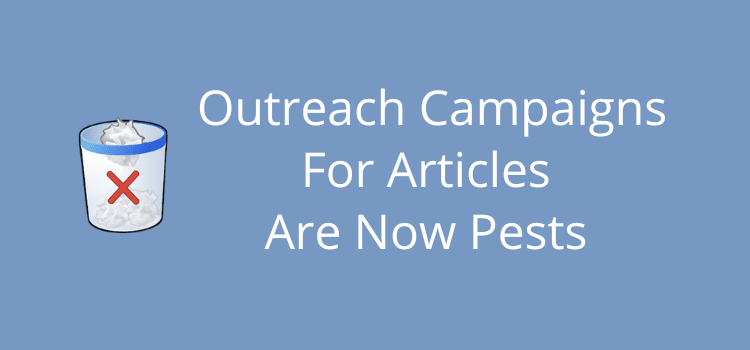
If you own a website, you’ll know that outreach campaigns for articles and backlinks are becoming so frequent that they compete with comment spam as a nuisance.
Every day, I delete bundles of emails offering me free articles, asking for backlinks, or offering to pay me to publish an article with dofollow links.
Back in 2014, guest posting was the big thing in SEO to gain extra backlinks. But over the years, the effectiveness has diminished greatly.
Yet the practice continues today, and it seems to be increasing.
Why outreach campaigns for articles are now (mostly) spam
Because it’s too easy.
So many tools are available now that make it simple to start an automated outreach campaign. Here’s an example.
One of the main features of these tools is harvesting email addresses from website contact forms. Therefore, NEVER use your personal email address on your site’s forms.
All these spammers need to do is import a list of domains, and the tools do the rest. One popular tool I know of allows 10,000 domains.
Then, it’s a simple matter of writing an email outreach template with placeholders for website domain names.
The sending limits are usually 500 per day because most tools use Gmail accounts, and 500 is the Gmail limit.
After the emails are sent, the tools usually have indicators to show if each email was delivered, opened, replied to, or received an auto-reply.
There are also automated tools to send follow-up emails if there is no reply.
However, unlike reputable mailing list services like Mailchimp, for example, you cannot unsubscribe from receiving these outreach emails.
The only way to manage them is to delete them from your inbox manually.
Why do they do it?
It’s a good question because Google has made it clear for many years that it doesn’t like guest posting to build backlinks.
In 2014, Matt Cutts from Google wrote this post. In the first line, he made Google’s position clear.
Okay, I’m calling it: if you’re using guest blogging as a way to gain links in 2014, you should probably stop. Why? Because over time it’s become a more and more spammy practice, and if you’re doing a lot of guest blogging then you’re hanging out with really bad company.
In 2020, John Muller added his thoughts on Twitter.
The other thing is that because this is so old, we have a lot of training data for our algorithms. I wouldn’t be surprised if the largest part of those links are just ignored automatically. If all that work is for ignored links, why not just do something useful instead?
Again, in 2020, a paid guest posting tool built by Semrush was removed after Google threatened to take action.
Guest articles continue despite the warnings
But still, the practice of asking for guest posts, offering free articles, and, of course, asking for dofollow backlinks and no sponsored labels continues.
Why? Because automation makes it so easy to chase the tiny percentage of inexperienced bloggers who might agree.
Automation using AI to write articles takes only a few seconds, so the offers of a free article have zero value. And it’s not about finding a new audience. It’s all about gaining dofollow backlinks, believing that Google can’t catch them all.
If the aim is simply to publish an article to find more readers, there are plenty of better and easier alternatives.
However, these spammers are still at work mainly because they are chasing backlinks to dubious sites that find it difficult to rank on Google.
These include essay writing services, gambling and casino sites, questionable health advice, and dating services, to name a few.
That’s why I delete all automated outreach campaigns asking me to publish articles on my site.
Can outreach campaigns work?
Without a doubt, and over the years, I have reacted positively to many of them.
The key signs for me of a legitimate outreach email are as follows.
1. The sender uses my name, which is easy to find on my site.
2. The sender’s email address is not a Gmail address. It’s from a company or site domain address.
3. It’s from a site or company related to my publishing or writing niche.
4. The message contains something useful or helpful for both of us.
5. There is no mention of backlinking or free articles.
6. The message is well-written, polite, and not from a template with placeholders.
I have made some great contacts this way. And I still work with many of them.
How can you manage annoying outreach messages?

It’s tough because there is no way to block these nuisances as you can do to manage comment spam.
I have tried many things.
The FAQ page on my site makes it clear that I don’t accept guest posts.
On the contact form page, I added these lines:
• We do not accept requests to publish commercial content or paid articles or respond to link-building outreach campaigns.
• Our site is no longer accepting submissions from guest writers.
I have an auto-reply that also makes it clear:
Guest posts
Thank you for your interest, but we are currently not accepting guest posts or articles for our site.
Requests for backlinks and content
Our site does not accept sponsored content, paid links, requests for backlinks, or offers of free articles.
But guess what?
With the tools they use, spammers ignore all this because they don’t need to visit my site. They don’t even need to use the contact form page.
Many of them reply to my auto-reply message, ignoring all the information.
Some become particularly annoying by sending follow-up messages every couple of days for a week or more.
A few even start to become aggressive because I don’t reply.
In the end, there is only one solution. Hit delete and send every message to trash.
Yes, it’s a pain if, like me, you have to do it ten, twenty, or even more times every day.
But it’s the only way.
Conclusion
Streams of requests to publish articles are the newest form of automated spam, and it is extremely annoying.
But you can do little to stop it, even if you believe that email address harvesting by these tools runs against all accepted privacy provisions.
But if there is one important takeaway from this post, it’s this.
Make sure you don’t use your personal email address in your blog or site’s contact form or anywhere else on your site.
Change your email address ASAP to save yourself some heartache.
Related reading: Reaching Out To You Or Contacting You? Who Gets A Reply?



